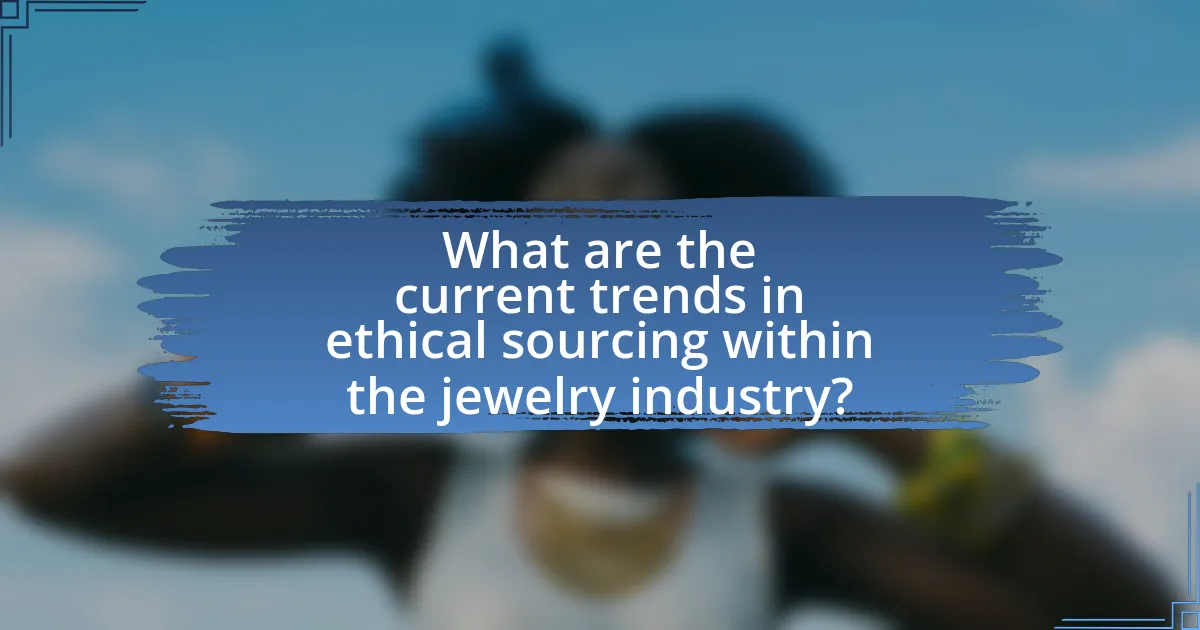The article focuses on current trends in ethical sourcing within the jewelry industry, highlighting the influence of consumer preferences on sourcing practices. Key trends include increased transparency, the adoption of lab-grown gemstones, and a commitment to sustainable materials. It discusses the ethical concerns consumers are most aware of, such as labor practices and environmental impact, and emphasizes the role of certifications in building consumer trust. Additionally, the article examines the economic implications of ethical sourcing for jewelry brands, the challenges they face in implementation, and how technology is facilitating transparency and engagement in the supply chain.

What are the current trends in ethical sourcing within the jewelry industry?
Current trends in ethical sourcing within the jewelry industry include increased transparency, the use of lab-grown gemstones, and a focus on sustainable materials. Transparency is driven by consumer demand for information about the origins of materials, leading brands to disclose supply chain practices. The rise of lab-grown gemstones offers an ethical alternative to mined stones, reducing environmental impact and ensuring conflict-free sourcing. Additionally, brands are prioritizing sustainable materials, such as recycled metals, to minimize ecological footprints. These trends reflect a significant shift in consumer preferences towards responsible and ethical practices in jewelry production.
How are consumer preferences influencing ethical sourcing practices?
Consumer preferences are significantly influencing ethical sourcing practices by driving demand for transparency and sustainability in the jewelry industry. As consumers increasingly prioritize ethical considerations, brands are compelled to adopt responsible sourcing methods to meet these expectations. For instance, a 2021 survey by the Ethical Consumer Research Association found that 70% of consumers are willing to pay more for ethically sourced products, indicating a clear market shift towards ethical practices. This consumer behavior pressures companies to disclose their supply chains and ensure that materials are sourced responsibly, thereby promoting fair labor practices and environmental sustainability.
What specific ethical concerns are consumers most aware of?
Consumers are most aware of ethical concerns related to labor practices, environmental impact, and sourcing of materials in the jewelry industry. Specifically, they are concerned about the exploitation of workers, particularly in developing countries, where unfair wages and unsafe working conditions are prevalent. Additionally, consumers are increasingly aware of the environmental degradation caused by mining practices, including habitat destruction and pollution. The sourcing of conflict minerals, such as diamonds and gold, which may finance violence and human rights abuses, also raises significant ethical concerns among consumers. These issues are supported by reports from organizations like Amnesty International and the World Wildlife Fund, which highlight the negative social and environmental consequences associated with unethical sourcing practices in the jewelry sector.
How do consumer values shape the demand for ethically sourced jewelry?
Consumer values significantly shape the demand for ethically sourced jewelry by prioritizing sustainability, social responsibility, and transparency in production practices. As consumers increasingly seek products that align with their ethical beliefs, they favor jewelry that is sourced from conflict-free zones and produced under fair labor conditions. A study by the Ethical Consumer Research Association found that 66% of consumers are willing to pay more for ethically sourced products, indicating a strong market preference for jewelry that reflects these values. This shift in consumer behavior compels jewelry brands to adopt ethical sourcing practices to meet the growing demand, thereby influencing industry standards and practices.
What role do certifications and standards play in ethical sourcing?
Certifications and standards are crucial in ethical sourcing as they provide a framework for verifying compliance with ethical practices. These certifications, such as Fair Trade or Responsible Jewelry Council standards, ensure that materials are sourced responsibly, promoting fair labor practices and environmental sustainability. For instance, the Responsible Jewelry Council’s Code of Practices outlines requirements for ethical sourcing, which helps consumers identify products that align with their values. By adhering to these standards, companies can build trust with consumers, who increasingly demand transparency and accountability in the jewelry industry.
Which certifications are most recognized in the jewelry industry?
The most recognized certifications in the jewelry industry include the Responsible Jewellery Council (RJC) certification, the Kimberley Process Certification Scheme (KPCS), and the Fair Trade Gold certification. The RJC certification ensures that companies adhere to ethical, social, and environmental standards throughout their supply chains. The Kimberley Process focuses on preventing the trade of conflict diamonds, ensuring that diamonds are sourced from conflict-free regions. Fair Trade Gold certification guarantees that gold is sourced from small-scale miners who meet specific social, economic, and environmental criteria. These certifications are widely acknowledged and help consumers make informed choices about ethically sourced jewelry.
How do these certifications impact consumer trust and purchasing decisions?
Certifications significantly enhance consumer trust and influence purchasing decisions by providing assurance of ethical practices. When consumers see certifications, such as Fair Trade or Responsible Jewelry Council, they perceive a commitment to social and environmental standards, which fosters confidence in the brand. Research indicates that 66% of consumers are willing to pay more for products from companies committed to positive social and environmental impact, demonstrating that certifications can directly affect buying behavior. Furthermore, a study by Nielsen found that 73% of millennials are willing to pay extra for sustainable offerings, underscoring the importance of certifications in shaping consumer preferences in the jewelry industry.
What are the economic implications of ethical sourcing for jewelry brands?
The economic implications of ethical sourcing for jewelry brands include increased consumer demand, potential cost adjustments, and enhanced brand loyalty. As consumers become more aware of ethical issues, they are increasingly willing to pay a premium for jewelry that is sourced responsibly, which can lead to higher profit margins for brands that adopt ethical practices. A study by the Ethical Consumer Research Association found that 66% of consumers are willing to pay more for ethically sourced products, indicating a significant market opportunity. However, ethical sourcing may also involve higher production costs due to the need for compliance with fair labor practices and sustainable sourcing methods. Brands that successfully navigate these challenges can foster stronger customer relationships and differentiate themselves in a competitive market, ultimately leading to long-term economic benefits.
How does ethical sourcing affect pricing strategies in the jewelry market?
Ethical sourcing significantly impacts pricing strategies in the jewelry market by increasing production costs, which are then reflected in retail prices. Jewelry brands that prioritize ethical sourcing often invest in sustainable materials, fair labor practices, and traceability, leading to higher operational expenses. For instance, a study by the Ethical Trading Initiative found that companies committed to ethical sourcing may incur costs that are 10-20% higher than those using conventional supply chains. Consequently, these brands typically adopt premium pricing strategies to maintain profit margins while appealing to ethically conscious consumers who are willing to pay more for responsibly sourced products.
What are the potential financial benefits for brands adopting ethical sourcing?
Brands adopting ethical sourcing can experience increased consumer loyalty and higher sales, leading to improved financial performance. Research indicates that 66% of global consumers are willing to pay more for sustainable brands, which directly translates to increased revenue for companies that prioritize ethical practices. Additionally, ethical sourcing can enhance brand reputation, attracting new customers and retaining existing ones, ultimately resulting in a stronger market position and long-term profitability.

How is technology facilitating ethical sourcing in the jewelry industry?
Technology is facilitating ethical sourcing in the jewelry industry through blockchain, which enhances traceability and transparency in the supply chain. By utilizing blockchain technology, companies can track the origin of materials, ensuring that gemstones and metals are sourced from conflict-free zones and ethically responsible mines. For instance, Everledger, a blockchain-based platform, allows jewelers to verify the provenance of diamonds, providing consumers with proof of ethical sourcing. This level of transparency not only builds consumer trust but also encourages responsible practices among suppliers, as they are held accountable for their sourcing methods.
What technological innovations are being used to ensure ethical sourcing?
Technological innovations ensuring ethical sourcing include blockchain technology, artificial intelligence, and advanced supply chain management systems. Blockchain provides a transparent and immutable ledger that tracks the origin of materials, allowing consumers to verify the ethical sourcing of products. For instance, companies like Everledger utilize blockchain to trace diamonds from mine to market, ensuring they are conflict-free. Artificial intelligence enhances supply chain transparency by analyzing data to identify unethical practices and optimize sourcing decisions. Additionally, advanced supply chain management systems enable real-time monitoring of suppliers, ensuring compliance with ethical standards. These technologies collectively enhance accountability and trust in the sourcing process within the jewelry industry.
How do blockchain and traceability enhance transparency in the supply chain?
Blockchain and traceability enhance transparency in the supply chain by providing immutable records of transactions and product journeys. This technology allows all stakeholders, including consumers, to access verified information about the origin, handling, and movement of goods. For instance, a study by IBM and the National Retail Federation found that 73% of consumers are willing to pay more for brands that offer complete transparency in their supply chains. By utilizing blockchain, companies can ensure that every step of the supply chain is documented and traceable, reducing the risk of fraud and unethical practices. This level of transparency builds consumer trust and encourages ethical sourcing, particularly in industries like jewelry, where provenance is crucial.
What role does social media play in promoting ethical sourcing practices?
Social media plays a crucial role in promoting ethical sourcing practices by facilitating transparency and consumer engagement. Platforms like Instagram and Twitter allow brands to showcase their sourcing processes, share stories about artisans, and highlight sustainable practices, thereby building trust with consumers. According to a 2021 survey by the Ethical Consumer, 62% of consumers reported that social media influenced their purchasing decisions regarding ethically sourced products. This demonstrates that social media not only raises awareness but also drives demand for ethical sourcing in the jewelry industry.
How can technology improve consumer engagement with ethical sourcing?
Technology can improve consumer engagement with ethical sourcing by providing transparency and traceability in supply chains. Blockchain technology, for instance, allows consumers to verify the origins of materials used in jewelry, ensuring they are sourced ethically. A study by the World Economic Forum highlights that 66% of consumers are willing to pay more for sustainable brands, indicating that technology-driven transparency can enhance consumer trust and loyalty. Additionally, mobile applications can facilitate direct communication between consumers and producers, fostering a sense of community and shared values around ethical sourcing practices.
What apps or platforms are available for consumers to verify ethical sourcing?
Apps and platforms available for consumers to verify ethical sourcing include Good On You, Ethical Consumer, and Buycott. Good On You provides ratings for fashion brands based on their ethical practices, including labor rights and environmental impact. Ethical Consumer offers a comprehensive database that evaluates companies on various ethical criteria, allowing consumers to make informed choices. Buycott enables users to scan barcodes and learn about a product’s sourcing and company practices, promoting transparency in consumer purchasing. These platforms empower consumers to support brands that align with their values regarding ethical sourcing.
How does technology help consumers make informed purchasing decisions?
Technology helps consumers make informed purchasing decisions by providing access to vast amounts of information and tools for comparison. Online platforms enable consumers to read reviews, compare prices, and evaluate product specifications, which enhances their understanding of available options. For instance, a study by the Pew Research Center found that 82% of smartphone users consult their devices while shopping, indicating that technology significantly influences purchasing behavior. Additionally, apps and websites dedicated to ethical sourcing allow consumers to verify the origins of materials, ensuring that their purchases align with their values regarding sustainability and ethical practices in the jewelry industry.

What challenges do brands face in implementing ethical sourcing?
Brands face several challenges in implementing ethical sourcing, primarily including supply chain transparency, cost implications, and compliance with varying standards. Supply chain transparency is difficult due to the complexity of sourcing materials from multiple suppliers, which can obscure unethical practices. Cost implications arise as ethical sourcing often requires higher investments in sustainable materials and fair labor practices, potentially leading to increased product prices. Compliance with varying standards is challenging as different regions and organizations have distinct ethical guidelines, making it hard for brands to maintain consistent practices across their operations. These challenges can hinder the effective implementation of ethical sourcing strategies in the jewelry industry.
What are the common obstacles to adopting ethical sourcing practices?
Common obstacles to adopting ethical sourcing practices include high costs, lack of transparency in supply chains, and insufficient consumer demand. High costs often deter companies from implementing ethical sourcing due to the increased expenses associated with sourcing materials responsibly. Lack of transparency in supply chains complicates the ability to verify the ethical practices of suppliers, making it difficult for companies to ensure compliance. Insufficient consumer demand can lead to a reluctance among businesses to invest in ethical sourcing, as they may not see a return on investment. According to a 2021 report by McKinsey & Company, 66% of consumers are willing to pay more for sustainable brands, indicating that while there is potential for demand, it is not yet universally strong enough to drive widespread change.
How do supply chain complexities hinder ethical sourcing efforts?
Supply chain complexities hinder ethical sourcing efforts by creating challenges in transparency and traceability. These complexities often involve multiple tiers of suppliers, making it difficult for companies to monitor labor practices and environmental standards throughout the entire supply chain. For instance, a study by the World Economic Forum highlights that 70% of companies struggle to trace the origin of their materials, which directly impacts their ability to ensure ethical sourcing. Additionally, the intricate web of suppliers can lead to unintentional complicity in unethical practices, such as child labor or environmental degradation, as companies may lack visibility into the practices of their upstream suppliers.
What are the financial challenges associated with transitioning to ethical sourcing?
Transitioning to ethical sourcing presents several financial challenges, including increased costs for raw materials, supply chain adjustments, and potential loss of existing supplier relationships. Ethical sourcing often requires businesses to invest in more expensive materials that meet sustainability and ethical standards, which can raise production costs by 20% to 30%. Additionally, companies may need to overhaul their supply chains to ensure compliance with ethical practices, leading to further financial strain due to new logistics and supplier vetting processes. Furthermore, existing suppliers may not meet the new ethical standards, resulting in the need to establish new partnerships, which can disrupt operations and incur additional costs. These financial challenges can significantly impact profit margins and require careful financial planning and investment.
How can brands overcome these challenges to meet consumer demands?
Brands can overcome challenges to meet consumer demands by adopting transparent supply chains and prioritizing ethical sourcing practices. Implementing traceability systems allows brands to provide consumers with information about the origins of materials, which aligns with the growing consumer preference for ethically sourced products. According to a 2021 survey by Nielsen, 73% of global consumers are willing to change their consumption habits to reduce environmental impact, highlighting the importance of sustainability in purchasing decisions. By investing in sustainable practices and communicating these efforts effectively, brands can build trust and loyalty among consumers, ultimately meeting their demands for ethical products.
What strategies can brands employ to enhance their ethical sourcing practices?
Brands can enhance their ethical sourcing practices by implementing transparent supply chain management, conducting regular audits, and engaging in direct partnerships with suppliers. Transparent supply chain management allows brands to trace the origin of materials, ensuring they are sourced responsibly. Regular audits, such as those conducted by third-party organizations, help verify compliance with ethical standards, reducing the risk of exploitation. Engaging directly with suppliers fosters relationships that encourage fair labor practices and sustainable sourcing methods. According to a 2021 report by the Ethical Trading Initiative, brands that adopt these strategies can significantly improve their ethical sourcing outcomes and consumer trust.
How can collaboration within the industry promote better ethical sourcing?
Collaboration within the jewelry industry can promote better ethical sourcing by enabling shared standards and practices among companies. When businesses work together, they can establish common guidelines for sourcing materials responsibly, which can lead to increased transparency and accountability. For instance, initiatives like the Responsible Jewelry Council set industry benchmarks that members must adhere to, ensuring that sourcing practices align with ethical standards. This collective approach not only enhances consumer trust but also encourages suppliers to adopt ethical practices, as they are more likely to comply with industry-wide expectations.
What practical steps can consumers take to support ethical sourcing in jewelry?
Consumers can support ethical sourcing in jewelry by choosing to purchase from brands that are transparent about their supply chains and sourcing practices. This includes researching companies that provide information on the origin of their materials, such as conflict-free diamonds or recycled metals. Additionally, consumers can look for certifications from organizations like the Responsible Jewelry Council, which ensures adherence to ethical standards. Engaging with brands through social media or direct inquiries about their sourcing practices can also encourage greater accountability. By prioritizing purchases from ethical sources, consumers can drive demand for responsible practices in the jewelry industry.

